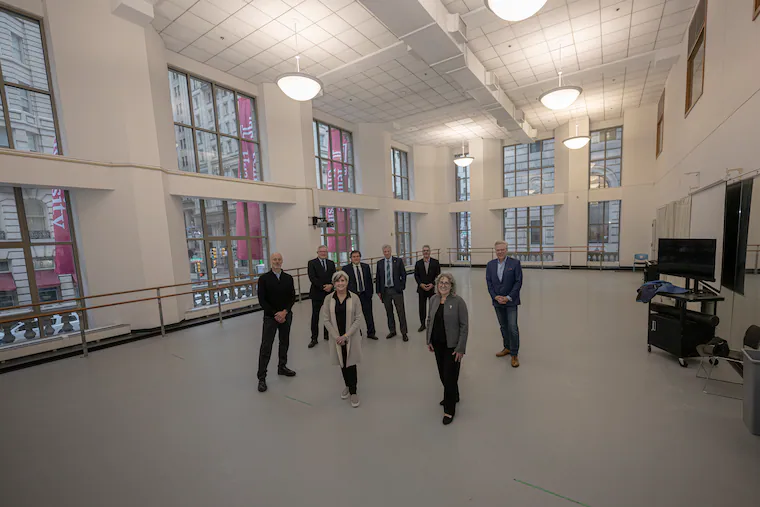Copyright The Philadelphia Inquirer

Robert Stroker walked into the second floor dance studio with floor-to-ceiling windows, looking out on Broad Street, across from the iconic Bellevue Hotel. “This is my favorite,” said Stroker, dean of Temple University’s Center for the Performing and Cinematic Arts. “This brings Temple University and the arts live to anybody walking by on Broad Street. For our students to be able to interact and learn in this facility is just so exciting.” The dance studio is one of the signature attractions in the 17-story Terra Hall, formerly owned by the now-shuttered University of the Arts. Temple purchased it earlier this year for $18 million. Temple intends to make the building its new Center City campus, giving the North Philadelphia-based university a prime location on the Avenue of the Arts. The move furthers Temple president John Fry’s vision to partner even more with the city’s cultural organizations, including the Philadelphia Orchestra — about 30 members of the orchestra already teach at Temple — and Ensemble Arts, and open the school for more community events. » READ MORE: Judge approves sale of UArts’ Terra Hall to Temple University for $18 million “People think about medicine and Fox [School of Business] and Beasley [School of Law] and all the things Temple does on that side,” Fry said, “but Temple has been an arts organization for almost 120 years, and we have made a profound contribution to the arts across the spectrum. This is going to be very visible in Center City going forward. Temple really is stepping things up and moving into that space.” The university will renovate the space and plans to move some art and music programs there, in addition to programs and offices currently housed at its leased Center City campus at 1515 Market St. The building will reopen in fall 2027 with about 2,500 credit students and some non-credit students taking classes there, Temple officials said. “We see ourselves moving into the position UArts occupied and occupied very well before their demise,” Fry said. “But the way we want to go about it is through a network” of partnerships. Building an innovation corridor Fry sees Terra Hall as the main anchor at one end of what he’s calling an innovation corridor that would stretch past Temple’s main campus to its health sciences campus farther north on Broad Street. The university also is proposing to merge with the Library Company of Philadelphia on Locust Street, which has 500,000 rare books, manuscripts, prints, photographs, works of art, ephemera, and other objects spanning the 17th through 19th centuries. » READ MORE: Temple University-Library Company of Philadelphia merger moves ahead to next steps Before Temple reopens Terra Hall, there’s a lot of work to be done on the infrastructure, including elevator, roof, and foundation repairs, window replacement, and mechanical system upgrades, said Jerry Leva, vice president of capital planning projects and operations. While UArts lagged on deferred maintenance, its arts spaces by contrast are in very good condition, he said. Temple’s board of trustees last month approved $35 million in renovations — $30 million of which is coming from the Commonwealth. Temple officials during a tour Monday showed off the building’s many arts spaces, including a black box theater, dance studios, recording studios, soundproofed practice rooms, space for a virtual reality lab, and a 160-seat auditorium that can be used for film screenings and performances. “This space is so much more accessible than what we have in North Philadelphia for certain types of opportunities linked to the arts,” said Susan Cahan, dean of Temple’s School of Art & Architecture. Tyler plans to move all of its graduate programs in the architecture and built environment disciplines to Terra Hall. That includes architecture, landscape architecture, city and regional planning, and facilities management and historic preservation. “For us, this is going to provide a hub to be able to bring guest speakers in and to be able to have our students have easy access to City Hall where many of our planning students have internships,” Cahan said. She noted that studying in Center City amid its distinctive architecture is another plus. Tyler also this fall began leasing space at the Pennsylvania Academy of Fine Arts, giving art students new academic offerings and access to PAFA’s sweeping collection of American art, while providing precious studio space for recent Temple MFA grads. » READ MORE: Temple University stakes out a Center City outpost at PAFA. Is there more to come? Stroker said music students will take advantage of the recording studios and soundproof practice rooms. One of the college’s fastest-growing majors is music technology, now enrolling more than 200 students, he said. The university plans to use the black box theater for its 60-person electroacoustic ensemble project rehearsals. The group currently rehearses in the basement of Boyer College of Music and Dance’s Rock Hall on the main campus. “They have to break up into two 30-person ensembles because the room isn’t big enough,” said David Brown, vice dean for administrative affairs for the Center of Performing and Cinematic Arts. Temple took ownership of Terra Hall the day before the Philadelphia Eagles Super Bowl parade in February, and wasted no time announcing its new location. At 3 a.m., Temple employees hung a 40-foot Eagles banner in the dance studio window fronting Broad Street, with a big T for Temple in the corner. “Philly birds fly together,” the banner said, referencing Temple’s owl mascot. “Congratulations, Eagles!”



